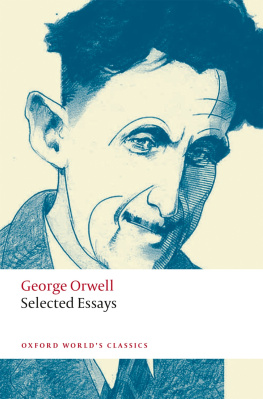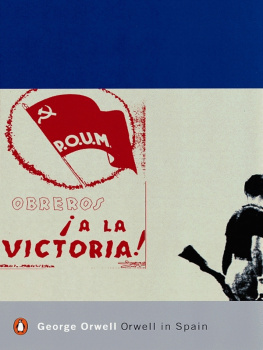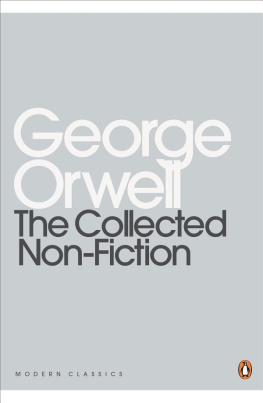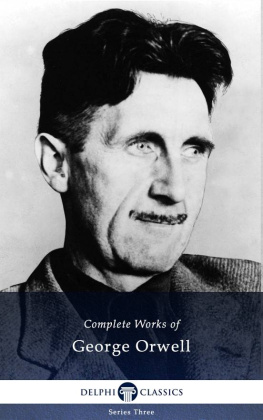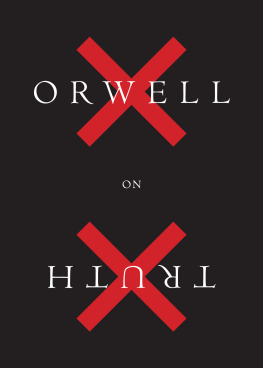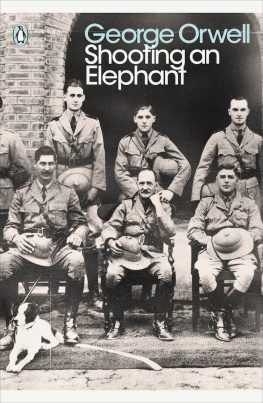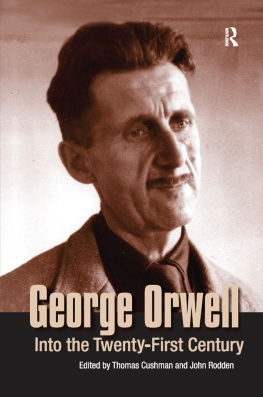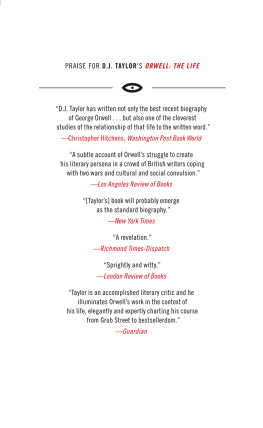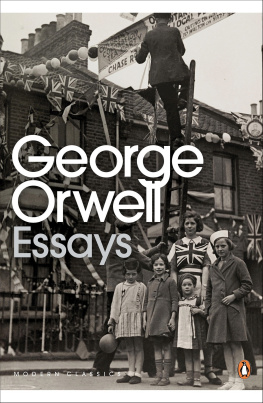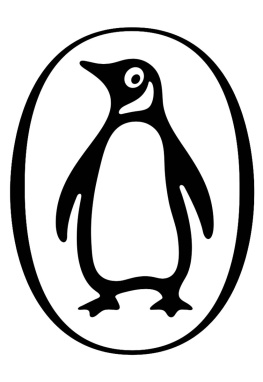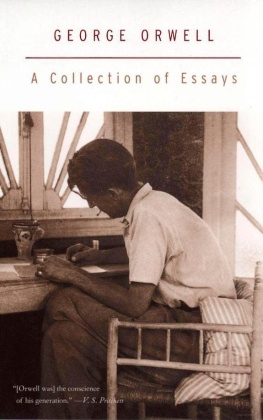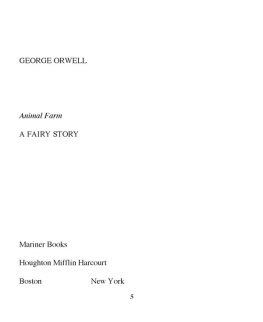George Orwell was born Eric Arthur Blair in 1903 in Motihari, in modern Bihar, where his father worked in the Indian Civil Service. He grew up in Oxfordshire and was a Kings Scholar at Eton from 1917 to 1921. Between 1922 and 1927, he worked for the Indian Imperial Police; after returning to England, he spent some years living as a tramp and casual manual worker, episodes that informed Down and Out in Paris and London, published in 1933 under his newly chosen pseudonym George Orwell. His first novel, Burmese Days, which drew on his imperial experience, appeared in 1934. Between 1935 and 1940 he published three more novels and three non-fiction works, including The Road to Wigan Pier (1937) and Homage to Catalonia (1938), an account of his time fighting in the Spanish Civil War as a Republican volunteer. In 1936 he married Eileen OShaughnessy, who died in 1945. At the beginning of the Second World War Orwell, turned down for military service due to ill health, joined the Home Guard. From 1941 to 1943 he worked as a talks producer for the BBC Eastern Service, after which he became literary editor of the left-wing weekly Tribune for two years, to which he also contributed a column As I Please. Throughout the war he wrote a large number of occasional articles and periodical essays. Orwells political satire Animal Farm, was completed by the end of February 1944 but not published until August 1945, when it enjoyed enormous success. From 1946 he spent long periods on the isle of Jura in the Inner Hebrides working on the novel that became Nineteen Eighty-Four and struggling with worsening tuberculosis; the novel was published in 1949, again to great acclaim. Confined to a sanatorium, he married his second wife, Sonia Brownell, late in 1949; he died of a tubercular haemorrhage in January the following year.
Stefan Collini is Professor Emeritus of Intellectual History and English Literature at Cambridge University, and a Fellow of the British Academy. He is the author of, among other books, Absent Minds: Intellectuals in Britain (2006), Common Reading: Critics, Historians, Publics (2008), Common Writing: Literary Culture and Public Debate (2016), and, most recently, The Nostalgic Imagination: History in English Criticism (2019).
oxford worlds classics
For over 100 years Oxford Worlds Classics have brought readers closer to the worlds great literature. Now with over 700 titlesfrom the 4,000-year-old myths of Mesopotamia to the twentieth centurys greatest novelsthe series makes available lesser-known as well as celebrated writing.
The pocket-sized hardbacks of the early years contained introductions by Virginia Woolf, T. S. Eliot, Graham Greene, and other literary figures which enriched the experience of reading. Today the series is recognized for its fine scholarship and reliability in texts that span world literature, drama and poetry, religion, philosophy and politics. Each edition includes perceptive commentary and essential background information to meet the changing needs of readers.

Great Clarendon Street, Oxford, ox2 6dp , United Kingdom
Oxford University Press is a department of the University of Oxford. It furthers the Universitys objective of excellence in research, scholarship, and education by publishing worldwide. Oxford is a registered trade mark of Oxford University Press in the UK and in certain other countries
Editorial material Stefan Collini 2021
The moral rights of the author have been asserted
First published as an Oxford Worlds Classics paperback 2021
Impression: 1
All rights reserved. No part of this publication may be reproduced, stored in a retrieval system, or transmitted, in any form or by any means, without the prior permission in writing of Oxford University Press, or as expressly permitted by law, by licence or under terms agreed with the appropriate reprographics rights organization. Enquiries concerning reproduction outside the scope of the above should be sent to the Rights Department, Oxford University Press, at the address above
You must not circulate this work in any other form and you must impose this same condition on any acquirer
British Library Cataloguing in Publication Data
Data available
ISBN 9780198804178
ebook ISBN 9780192526199
Printed and bound in Great Britain by Clays Ltd, Elcograf S.p.A.
CONTENTS
Politically, Swift was one of those people who are driven into a sort of perverse Toryism by the follies of the progressive party of the moment (p. 233). At first sight, Jonathan Swift may seem an unlikely figure to appeal to George Orwell: the early eighteenth-century Irish churchman, known as the gloomy Dean, who wrote elaborate and savage satires on human folly appears worlds removed from the mid-twentieth-century journalist, novelist, and self-described democratic socialist. But, as so often in Orwells best essays, an element of unacknowledged identification is what quickens the pulse of his prose, especially when it allows him to catch readers off guard or to make them uncomfortable. For it could be said that one of the most central and enduring of Orwells themes as an essayist and journalist was precisely the follies of the progressive party of the moment, that is to say, principally the actions of those on the Left who took a sympathetic, or at least protective, view of Soviet Russia as a society attempting to realize the ideals of solidarity and social justice. Orwell understood that his reaction, like Swifts, could be seen as perverse, as concentrating his critical fire on those who might seem like natural allies. Yet the element of perversity is also part of what recommends this stance to Orwell, since he sees it as a kind of strength, a form of autonomy, especially in suggesting that the individual in question is unlikely to kow-tow to the orthodoxies of the moment. And driven may seem to absolve both Swift and, by implication, Orwell himself from the responsibility of having freely chosen such a mulish political stance. It is the times that are out of joint, so out of joint that one has little choice: one is simply driven to this. In such cases, the progressive party of the moment has a lot to answer for.
The essay on Gullivers Travels, in which this remark occurs, brings together several of Orwells preoccupations. He not only recognizes the satisfactions of a kind of Tory anarchism when the progressive forces of the day are all cant and humbug: he also wants to insist, against orthodox Marxists as well as against a residual urge in himself, that one can enjoy a work of literary art even while disapproving of its politics. He admires Swifts ability to make satire entertaining as well as pointedit was one notable expression of that effort to make political writing into an art that Orwell declared to be his own overriding aspiration from the mid-1930s onwards (p. 230)but he was no less drawn to Swifts delight in thrusting the disagreeable, animal aspects of life beneath the readers nose. (That organ was called into play with unusual frequency in Orwells writings, as he gleefully dwelt on a range of repulsive smells.) And there was, too, a temperamental affinity between two writers who, despite occasional lapses into optimism, seemed compulsively drawn to an Eeyorish view of themselves and the world.
Politics vs Literature: An Examination of Gullivers Travels is an essay, an example of that shortish, personal, sometimes meditative, sometimes argumentative, prose form in which Orwell excelled. Yet since his death in January 1950, his reputation has rested primarily on

